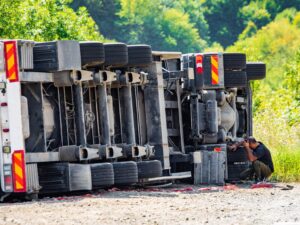What is Negligence?
Negligence is the failure to use a reasonable degree of care given the circumstances. The four elements of negligence are a duty owed to a plaintiff, a breach of that duty by the defendant, proximate cause, and injury or damage suffered by the plaintiff. It is essentially carelessness.
According to Black’s Law Dictionary, negligence is defined as “the failure to exercise the standard of care that a reasonably prudent person would have exercised in a similar situation.” As such, negligence refers to a failure to exercise the level of care that a reasonably prudent person would exercise in similar circumstances. It forms the basis of many personal injury claims and lawsuits, where a plaintiff alleges that their injuries or damages were caused by the negligent actions or omissions of another party.
Key elements of negligence include:
- Duty of care: The legal obligation of an individual or entity to exercise reasonable care to avoid causing harm to others. This duty may arise from professional relationships, ownership of property, or other circumstances.
- Breach of duty: A failure to fulfill the duty of care by acting or failing to act in a way that deviates from what a reasonably prudent person would do.
- Causation: The link between the defendant’s breach of duty and the plaintiff’s injuries or damages. It must be shown that the defendant’s actions or omissions directly caused harm to the plaintiff.
- Damages: Actual harm or losses suffered by the plaintiff as a result of the defendant’s negligent conduct, which may include physical injuries, emotional distress, property damage, or financial losses.
Legal principles related to negligence aim to compensate injured parties for their losses and encourage individuals and businesses to act responsibly to prevent foreseeable harm. For example, if your landlord doesn’t fix a rickety set of steps you let him to, and you fall through the steps a week later, the landlord is negligent in his duty of care. Understanding the elements of negligence is essential in personal injury cases and other legal disputes where liability is based on the failure to exercise reasonable care under specific circumstance
More information about Negligence
Bloomsburg Product Liability Lawyer
If you or a loved one has suffered serious injuries due to a defective product in Bloomsburg, PA, Munley Law’s dedicated Bloomsburg product liability lawyer is here to guide you through the complexities of your personal injury case.
When it comes to personal injury cases, especially those involving product liability, our experienced attorneys have successfully represented clients in Bloomsburg. We operate on a contingent fee basis, ensuring you don’t have to worry about upfront costs. We only get paid if we win your case, allowing you to focus on recovery without financial stress.
If you have lost wages, suffered emotional or physical injuries, or are dealing with the wrongful death of a loved one, our Munley Law’s Bloomsburg product liability attorneys are here to help.
What is Product Liability?
 In personal injury law, product liability refers to holding manufacturers, distributors, and sellers accountable for defective products that cause harm. […]
In personal injury law, product liability refers to holding manufacturers, distributors, and sellers accountable for defective products that cause harm. […]
More information about Negligence
Bloomsburg Premises Liability Lawyer
If you’ve experienced an injury on someone else’s property, we understand the challenges you face. The experienced team of Bloomsburg premises liability attorneys at Munley Law is here to represent you, focusing on Bloomsburg to be your trusted legal partner in seeking compensation for your personal injury case.
What is Premises Liability?
 Premises liability holds property owners responsible for injuries on their premises due to negligence. Property owners have a duty to maintain a safe environment for visitors, guests, and customers. When this duty is breached, resulting in injuries, the injured party may have grounds for a premises liability claim.
Premises liability holds property owners responsible for injuries on their premises due to negligence. Property owners have a duty to maintain a safe environment for visitors, guests, and customers. When this duty is breached, resulting in injuries, the injured party may have grounds for a premises liability claim.
If you’ve suffered an injury on someone else’s property in Bloomsburg, Pennsylvania, it’s crucial to comprehend the concept of premises liability. At Munley Law, our team of dedicated personal injury lawyers is here to guide you through the intricacies of this legal principle. […]
Read MoreMore information about Negligence
How to Determine Liability in Bethlehem Truck Collision Cases
Bethlehem roads are home to vehicles of all varieties, from SUVs and minivans to large trucks. Unfortunately, their presence poses an increased risk of serious accidents; when collisions do occur between these trucks and others, their effects can be both complex and devastating – leaving victims to understand liability in such cases beyond legal formalities; aid from an experienced Bethlehem truck accident attorney may prove invaluable during these trying times.
Munley Law can assist those involved in Bethlehem truck accidents to establish fault and prove liability.
How to Determine Liability in Bethlehem Truck Collision Cases
Locating at-fault parties and assigning liability in truck collision cases in Bethlehem is often an intricate and involved process due to all the parties and variables involved. Determining “who is at fault?” plays a central role here, shaping legal claims and the possibility of recovering damages.
Assessing the Role of a Truck Driver
 As with most actions taken against truck drivers, […]
As with most actions taken against truck drivers, […]
More information about Negligence
Williamsport Construction Accident Lawyer
Construction sites can be perilous for construction workers and the public alike. Construction is one of the most dangerous occupations in the United States. In fact, the Bureau of Labor Statistics reports that 1 in 5 workplace fatalities happen in the construction industry. But, construction workers are not the only ones who can be hurt by falling equipment or lack of proper safety measures.
If you or a loved one has been involved in a construction accident in Williamsport, we know the physical, emotional, and financial toll it can take. You do not have to bear this burden alone. At Munley Law, we have over 60 years of experience fighting for the rights of accident victims in Williamsport, Pennsylvania, including those involved in construction accidents. We can help your family recover the financial compensation that is owed to you and hold the negligent parties accountable. […]
Read MoreMore information about Negligence
Bloomsburg Bicycle Accident Lawyer
Navigating the charming streets of Bloomsburg, PA, on two wheels can be a delightful experience, but unfortunately, bicycle accidents can disrupt the tranquility of your ride. At Munley Law, your dedicated Bloomsburg bicycle accident lawyers, we understand the unique challenges bicycle accident victims face in our community. Whether you’re near Columbia County landmarks or exploring the beauty of Bloomsburg, our experienced law firm is here to guide you through the legal process and fight for the compensation you deserve.
Bicycle Accidents in Bloomsburg, PA: Understanding the Legal Process
In the aftermath of a bicycle accident in Bloomsburg, seeking the right lawyer who understands the local landscape is crucial. Munley Law specializes in personal injury law and has a proven track record in representing car accident victims, including those involved in bicycle accidents. Our experienced accident lawyers comprehend the emotional pain, injuries, and future medical bills that may follow such incidents. […]
Read More








